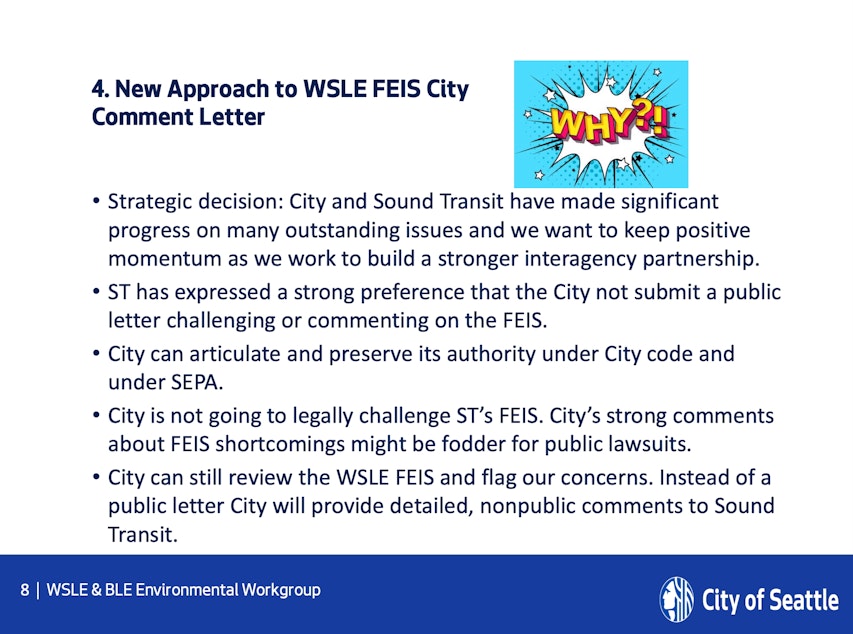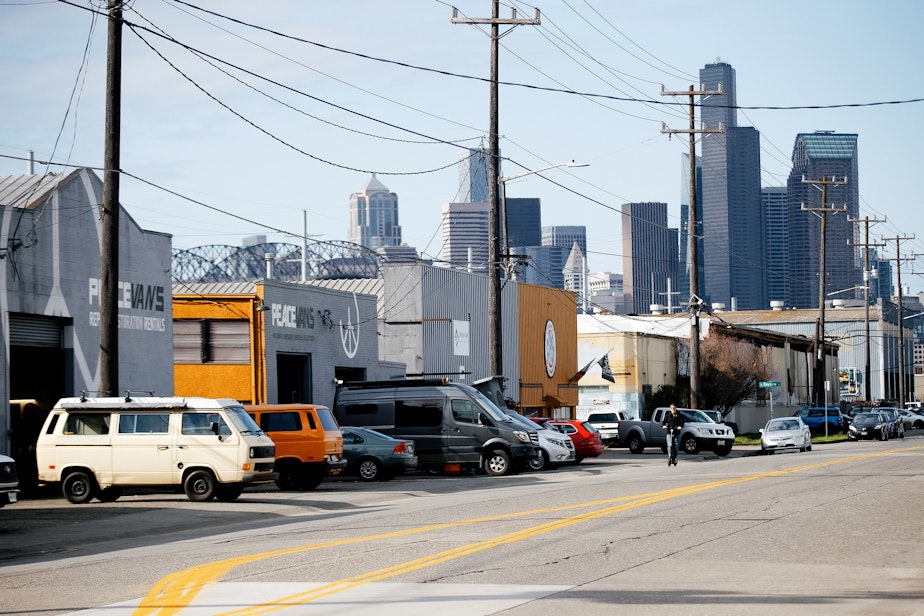City planned to withhold West Seattle light rail environmental concerns from regulators, public

Internal City of Seattle communications leaked to KUOW show that officials planned to withhold some environmental concerns from the public and federal regulators regarding Sound Transit’s planned West Seattle Link light rail extension.
The records, from last fall, detail “critical issues” that city departments found Sound Transit failed to properly address in the final environmental impact statement it filed for federal approval of the project.
In a 19-page draft response letter that KUOW reviewed, city officials wrote that Sound Transit still needed to lay out plans to restore salmon spawning habitat in Longfellow Creek that would be damaged by the light rail construction.
In a section on environmental justice, the city criticized Sound Transit as having failed to thoroughly assess “long-term impacts of displacement and relocation” that “could irrevocably harm” people from marginalized communities, without an adequate plan for compensation.
Rather than send this response in a public letter to regulators, as usual, internal city communication shows that Department of Transportation officials last September unveiled a different, two-pronged strategy in a presentation to other city departments.
The city’s public response to federal regulators would be short, supportive, and mention only a few concerns, the slide deck presentation explained. Then separately, the city would later send a “nonpublic letter” to Sound Transit detailing outstanding critical issues with the West Seattle Link extension. A bullet point on one slide called this plan “Good for City’s relationship with Sound Transit.”
Sponsored
“Sound Transit has expressed a strong preference that the City not submit a public letter challenging or commenting on the federal environmental impact statement,” read one slide. “City and Sound Transit have made significant progress on many outstanding issues and we want to keep positive momentum as we work to build a stronger interagency partnership.”
Political pressure to start construction on the West Seattle line has mounted after two years of delays and a massive jump in the projected price for the project, from $2.3 billion when voters approved it to as much as $7.1 billion. Construction is now projected to begin in 2027, with the service coming on line in 2032.
“City’s strong comments about final environmental impact statement shortcomings might be fodder for public lawsuits,” SDOT officials warned on one slide.

“I think it speaks for itself, this document,” said Jen Osborn, who said she’s waiting to learn whether Sound Transit might use eminent domain to take her family’s 104-year-old SoDo pest control business, Paratex, to build the West Seattle line.
Sponsored
Either way, Osborn predicts that construction of the route would devastate the neighborhood and, she feels, neither city leaders nor Sound Transit seem to care.
The city’s plan to conceal concerns about the project’s environmental impact confirms Osborn’s cynicism.
“I don't think they were listening - they were never going to be listening when the public had comment about impact, or lack of transparency,” Osborn said.
Seattle Department of Transportation spokesperson Ethan Bergerson defended the city’s approach.
“We are partnering with Sound Transit to build light rail extensions as quickly as possible by collaboratively working to complete environmental review and permitting processes which support high quality design choices and the needs of the residents and businesses who will be affected by construction,” Bergerson said by email.
Sponsored

At Alki Beach Academy, a child-care center that would be razed to build the West Seattle light rail line, Operations and Policy Director Jordan Crawley says moving their large child-care center is a massive undertaking and impossible with the $50,000 Sound Transit would provide.
“That's virtually nothing for any business, let alone one like ours, which we estimate is going to cost around $3 million to replace,” Crawley said.
He said he wants light rail in West Seattle, but through a fair and transparent process. He said that if citizens raise serious concerns to city officials about how a light rail line will affect citizens and the ecology, “and those officials decide not to directly address those concerns in a public way, for fear of upsetting Sound Transit or disrupting the process, that's a problem.”
Bergerson, spokesperson for the city, told KUOW that the leaked slide deck “describes a preliminary concept” for how the city would voice its critiques of Sound Transit’s environmental impact statement. Ultimately, he said, the city’s “strong procedural quality controls” “led to… the proper and more transparent approach” — a single, public comment letter to federal regulators listing more concerns, rather than privately sending those issues only to Sound Transit.
Sponsored
Compared to a September draft of the “critical issue” letter the city planned to send Sound Transit, however, the final public letter, sent in October, was much less critical.
City of Seattle West Seattle Link Extension Final Environmental Impact Statement Comment Letter
City of Seattle West Seattle Link Extension Final Environmental Impact Statement Comment Letter
While the city’s first version told Sound Transit that it failed to assess “long-term impacts of displacement and relocation” that “could irrevocably harm” marginalized communities along the West Seattle route, the city’s final letter said it “remains concerned about project impacts” on those communities.
The city’s first response draft said salmon spawning grounds in the path of the West Seattle light rail are “already insufficient” for the survival of baby salmon, and that Sound Transit had not planned enough restoration work.
The final, public letter alluded to habitat impacts that are part of “ongoing conversations” between the city and Sound Transit. It did not mention salmon.
Sponsored
A Sound Transit spokesperson denied that the agency asked the city not to publicize its concerns about the environmental impact statement and said Sound Transit welcomes such feedback.
After Sound Transit received Federal Transit Administration approval of its environmental assessment for the West Seattle extension this week, the agency can now start the full design phase of the project. Construction is slated to begin in 2027.




